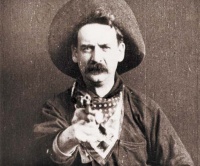Genre
From The Art and Popular Culture Encyclopedia

A simple example of the inherent meaning of genre in an art form is that of a western film where two men face each other on a dusty and empty road; one dons a black hat, the other white. Independent of any external meaning, there is no way to tell what the situation might mean, but due to the long development of the "western" genre, it is clear to the informed audience that they are watching a gunfight showdown between a good guy and a bad guy.
|
Related e |
|
Featured: |
- See also genre theory
A genre (French: "kind" or "sort") is a loose set of criteria for a category of literary composition; the term is also used for any other form of art or utterance.
In all art forms, genres are vague categories with no fixed boundaries. Genres are formed by sets of conventions, and many works cross into multiple genres by way of borrowing and recombining these conventions. The scope of the word "genre" is usually confined to art and culture, particularly literature and film genre.
In genre studies the concept of genre is often compared to originality.
Related
By medium: art genre - film genre - literary genre - music genre
Compare: genre art - genre film - genre fiction
Theory: genre theory and genre studies
Related: audience - category - content - convention - form - format - formula - gender - genre fiction - media - motif - mood - originality - parody - pastiche - periodization - setting - style - subject - trope - theme - topic
Mood: comedy - drama - erotica - fantasy - fantastic - fantastique - horror - melodrama - pornography - romance - tragedy
Setting: science fiction - western
By sensibility: avant-garde - camp - classic - cult - decadent - eccentric - eclectic - erotic - experimental - gay - gothic - grotesque - kitsch - macabre - modern - perverse - postmodern - queer - transgressive - underground
Contrast: originality

